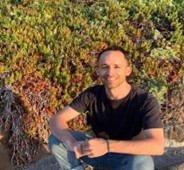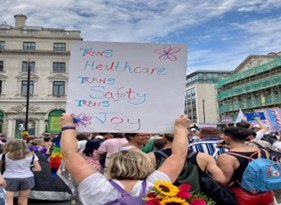Date: 05/07/2024
Author: Tomás Ojeda

Bio:
Dr Tomás Ojeda is a queer researcher and trained psychotherapist. He held an ESRC Postdoctoral Fellowship at the University of Brighton’s Centre for Transforming Sexuality and Gender (2022-2023), and Visiting Fellow position at the LSE Department of Gender Studies. His research interests lie in the intersections of queer theory, psychosocial studies, anti-gender politics and LGBTIQ+ mental health, with a particular focus on activist and academic responses to current attacks on gender-affirming care. He is the co-editor of the volume Transnational Anti-gender Politics: Feminist Solidarity in Times of Global Attacks (forthcoming, Palgrave Macmillan), and is a member of the Engenderings editorial collective.
Introduction
Those of us who work in the field of mental health and practice as psychotherapists, researchers, counsellors and community workers have heard iterations of the same statement multiple times: LGBTQIA+ people experience high rates of anxiety, depression and distress compared to the heterosexual and cisgender population, which can be explained by the social effects of discrimination, unemployment, hetero-cissexism and LGBTQIA+-phobia, among others.
Decades of research and activism, confirm time and again the validity of this assertion and its sad currency today: despite progress in LGBTQIA+ rights in many parts of the world, health disparities, institutional violence and barriers to accessing affirmative and depathologising care continue to play a central role in the narratives we tell about the wellbeing of minoritised communities (Boden-Stuart et al., 2022; Martínez et al., 2019; Zeeman et al., 2019).
Together with a group of mental health professionals and activists who work with LGBTQIA+ people in Chile and the UK, we came together to discuss these issues and exchange knowledge about our practice during March and May 2023. We shared our fears at the hostility towards trans health and its impact on people’s wellbeing, as well as the joys and challenges involved in working towards a better mental health for all. We wanted to write about the encounters we had through a research report, and in this blog piece I will share some of the main findings of these exchanges and possible responses to the problem of health disparities.
LGBTQIA+ mental health knowledge exchange
My research project focused on the following questions: What are the main challenges that mental health professionals face when working with LGBTQIA+ people? What does working from a depathologising and affirmative approach mean for us? What socio-political, cultural, economic and institutional contexts must be considered when thinking about this work? How do we build solidarity networks to resist the attacks, moral panics, and gender anxieties articulated against affirmative care?
These and other questions inspired a series of three Knowledge Exchange Workshops between March and May 2023 that were part of my postdoctoral project “The Multiple Lives of Sexual and Gender Diversity in the Psy Disciplines”, which were supported by the Economic and Social Research Council and the South Coast Doctoral Training Partnership. The workshops were attended by a group of fifteen mental health professionals from the cities of Valparaíso, Concepción and Santiago (Chile), and Brighton and Hove (UK), and aimed at exchanging knowledge on LGBTQIA+ mental health and learning about the state of health policies in both countries. We wanted to understand what a depathologising, reparative, affirmative and intersectional approach to LGBTQIA+ mental health means and does, looking specifically at the knowledge and practices that come from activist and academic spaces, as well as those that emerge from our experiences as psychotherapists, activists and researchers—most of whom are part of the same community we work with.
Depathologisation, reparation, affirmation, and intersectionality
During our conversations, we realised that many of these approaches are taken for granted. For example, it is widespread to hear that if we work with LGBTQIA+ people, of course we work from a depathologising and intersectional perspective. And we often repeat this without much reflection. This is why we wanted to delve deeper into the implications of these approaches, and to see how our own understandings of depathologisation and other related concepts changed as we talked and came across other definitions and experiences.
For the workshop participants, mental health work that aims to be transformative of the oppressive structures that contribute to ill-health must not only place depathologisation, but also affirmation, intersectionality and reparation at the centre as the guiding axes of our praxis. The articulated work of these four principles must be on the horizon of our social-community practice. Not only as a declaration of principles, but as critical tools at the service of action and liberation. We wanted to find out what ideas emerged in our exchanges, and how do we understand these approaches and principles. Below I propose a synthesis of the discussion which we then put together in our report:
Depathologisation: a principle that recognises non-normative sexualities and genders as normal variants of our sexuality and gender, promoting an inclusive view of human diversity and respectful of people’s bodily autonomy. Depathologisation insists on challenging the power that psy and medical disciplines have historically had over non-heterosexual and trans experiences, questioning the disciplines’ diagnostic and certification claims on our identity.
Reparation: puts into action concrete measures of redress and non-repetition of historical harms, abuses and human rights violations inflicted on minoritised groups through laws that criminalised our existences, through abusive medical and psychological interventions (e.g. genital mutilation of intersex people, conversion practices), and police and state violence (e.g. Chilean civil-military dictatorship).
Affirmation: recognises, celebrates and values diverse gender identities and expressions, sexual and/or romantic orientations outside a pathologising framework. It acknowledges the right of people to explore their gender on their own terms and at their own time, leaving out expectations of an ideal outcome or destination. An affirmative approach recognises the risks associated with dis-affirming gender identity and expression, as well as the negative impact of messages that insist that gender must conform to the gender assigned at birth.
Intersectionality: accounts for how different power structures (e.g. racial capitalism, ableism and cis-heteropatriarchy) intersect to shape people’s experiences of stress, oppression and access to health. An intersectional approach to mental health allows us to build alliances of solidarity and coalitions across struggles, and to challenge the myth that the rights of one group come at the expense of others.

Poster in support of trans health during the London Trans+ Pride, 2023 (photo by author)
“The personal is political” – in the streets, institutions and our consulting rooms!
As well as discussing the principles that guide our practice, we also examined the contexts in which we work and the socio-political and territorial conditions that shape people’s experiences of health and illness. By putting the onus on the social and political determinants that mark the life trajectories of those we accompany, some questions inevitably arise; although often uncomfortable, they are urgent and unavoidable:
- What does it mean to talk about LGBTQIA+ mental health in a context such as Chile, where denialism and relativisation of crimes against humanity that took place during the civil-military dictatorship marked the commemoration of its fiftieth anniversary in 2023; or where victims of eye trauma and police violence during the social uprising of 2019 have yet to obtain justice and reparation?
- What does it mean to work under a depathologising and affirmative approach in a context such as the United Kingdom where, recently, the possibility of banning conversion practices was conditioned only on the basis of sexual orientation and not on gender identity; or where a sixteen-year-old girl, Brianna Ghey, was stabbed to death and whose crime was driven, in part, by transphobia?
We know, because we have been told, that ‘politics’ is not very welcome in the institutions where we work; that when we speak back against racism or LGBTQIA+-phobic violence in our discipline, or when we cite the work of human rights groups we are labelled ‘activists’, as if it were a bad thing; as if our professional ‘neutrality’ was compromised. And the truth is that even if our experiences with activism and politics are different, our work has a clear and determined purpose in favour of social justice, inclusive feminism, gender equality and scientific rigour, which we claim as political.
To achieve this purpose, we are ‘active’, not neutral; active in speaking out against the effects of trans-hatred violence, discrimination and dehumanisation of people. It is also about our lives and the commitments we have made to the communities we work with, which go beyond our consulting rooms and workplaces, sometimes even taking to the streets when we participate in pride marches and commemorate the international day against homo, bi and transphobia, to name but a few.
While our work faces many challenges, one thing we learned through the workshops is that we cannot do all these things alone, that the conversation and encounter with different perspectives, in different locations and languages have transformative potential, and that working in alliances and coalitions with others is incredibly powerful. We invite you to read the report and share the material with your wider networks, so we can tackle the negative outcomes on the wellbeing of our communities together.
References
- Boden-Stuart, Z., McGlynn, N., Smith, M. C., Jones, H., & Hirani, R. (2022). Pathways between LGBTQ migration, social isolation and distress: liberation, care and loneliness. Retrieved from this document link.
- Martínez, C., Tomicic, A., & del Pino, S. (2019). Disparidades y Barreras de Acceso a la Salud Mental en Personas LGBTI+: El Derecho a una Atención Culturalmente Competente [Disparities and Barriers to Access to Mental Health in the Case of LGBTI+ People: The Right to Culturally Competent Care]. In F. Vargas Rivas (Ed.), Informe Anual sobre Derechos Humanos en Chile 2019 (pp. 397–446). Ediciones Universidad Diego Portales.
- Zeeman, L., Sherriff, N., Browne, K., McGlynn, N., Mirandola, M., Gios, L., … De Sutter, P. (2019). A review of lesbian, gay, bisexual, trans and intersex (LGBTI) health and healthcare inequalities. European Journal of Public Health, 29(5), 974–980. https://doi.org/10.1093/eurpub/cky226